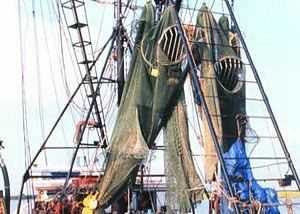|
For a few weeks, shrimpers in some Southern US waters this month are allowed to fish without towing Turtle Excluder Devices (TEDs), so long as they keep their tows shorter than 75 minutes. Federal fishery managers took the unusual step of temporarily loosening the requirement because Tropical Storm Isidore and hurricane Lili, left "excessive amounts of debris...which make trawling with TED-equipped nets impractical," according to the National Marine Fisheries Service.
The use of TEDs is normally required in order to allow endangered sea turtles to escape from shrimp nets. In the wake of the storms, however, state fishery managers intervened with NMFS to request special dispensation. "Their investigations indicated that increased amounts of debris in the shrimping grounds were causing TEDs to become clogged and ineffective," the federal agency reports. Federal officials looked into the problem and "confirmed the need for these authorisations" to temporarily ease the TED requirement in some waters.
In Houma, Louisiana, the newspaper Houma Today reported that "locally, shrimpers have reported scooping up everything from dead calves to small refrigerators in their nets as a result of the storms. Most of the documented debris has consisted of clumps and mats of marsh vegetation, along with trees, bushes and branches."
The replacement of TED requirements with a short-tow rule still doesn't guarantee a debris-free net, but fishermen have welcomed the change as they grapple with storm debris as well as low prices. The general decline in shrimp prices, coupled with a strong influx of imports in certain sizes of shrimp, have already stirred shrimpers to seek trade protections. The debris, which not only clogs the net but can damage the catch, only complicated their lives further.
The rule change only applies in certain inshore waters of Mississippi, Alabama, and Louisiana. The special dispensation is set to last through 21 November in Mississippi and through 1 December in Alabama and Louisiana, although officials say they may reinstitute the usual TED requirements sooner if the debris problems clears up sooner.
ECBC has evidence that grids and escape hatches, currently on trial by UK vessels are similar to those which were used in the New Zealand squid fishery. The UK Government hopes that these devices will reduce cetacean bycatch. However they are known to have resulted in the deaths of sea lions in the New Zealand fishery; there use in European waters will undoubtedly result in the deaths of many cetaceans.
For further information, please e-mail info@eurocbc.org or write to ECBC, PO BOX 366, CHATHAM. KENT. UK ME5 7WE
|
